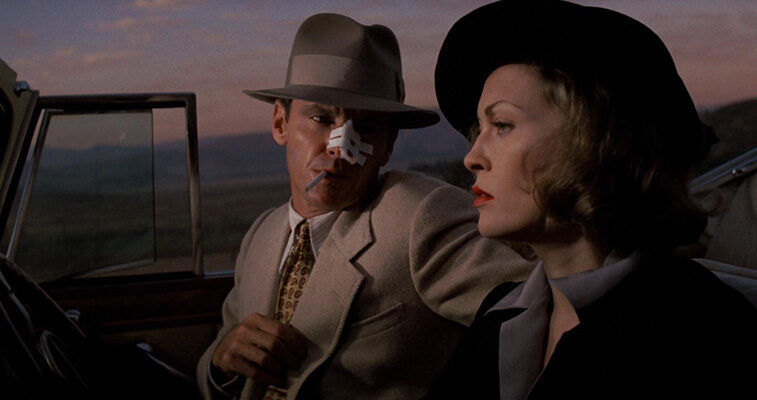[9]
Chinatown is the name of the movie, but only a short final scene takes place there. One could argue the film is a journey to its namesake, but even that’s not enough to explain the title. In a rare intimate scene in the film, Jack Nicholson tells Faye Dunaway about his time as a cop working in Chinatown. He tried to help a woman, but his actions only ended up hurting her. The experience hardened Nicholson’s character. He became cynical and detached. Through the events of Robert Towne’s tight-knit screenplay, he gets pulled into Dunaway’s life and gets a second chance to help a woman in need. But despite his best efforts, he ends up back in Chinatown. And Chinatown always wins.
On its surface, Chinatown is an old fashioned detective story set in 1930s Los Angeles. We follow Nicholson as he’s hired by a woman to spy on a man having an affair, but one thing leads to another and Nicholson finds himself inadvertently uncovering a conspiracy involving drought, the water company, real estate, money, and murder. If Chinatown merely imitated the film noir of the 30s and 40s, it would find its fans among the nostalgic. But it distinguishes itself by subverting key aspects of this well-established film genre. There’s no Maltese Falcon or ‘stuff that dreams are made of’ motivating characters. There’s real world deception on a grand scale, which in the years following Vietnam and the Watergate scandal gives Chinatown immediacy in place of mythology. It also plays with our expectations of the femme fatale. Faye Dunaway’s widowed, wealthy character looks the part and acts it at times. Is she dangerous, or is she a victim? Can Nicholson trust her?
Dry procedural narratives are rarely this engaging. But as Nicholson wades through the clues, he uncovers not only a mystery, but the screenplay’s emotional heart. His and Dunaway’s characters, both damaged by the past, gradually lower their defenses with one another. The film’s climax comes with a deeply emotional revelation that colors everything that happens before and after. Nicholson and Dunaway give masterfully measured performances in this film — hiding, deflecting, caving, and ever-so cautiously reaching out for connection.
Director Roman Polanski (Repulsion, Rosemary’s Baby) assists by presenting most of the movie from Nicholson’s direct point-of-view. We’re over his shoulder for the most of the movie — like a modern day ‘first person shooter’ video game. Polanski chose not to embellish the film with all the usual film noir stylizations. Whether the film would be better with more smoke and shadow is up for debate. It may be more impressive that the film works without those bells and whistles. And the evocative power of Jerry Goldsmith’s score can’t be overstated, either. A solo trumpet stands in for Nicholson’s character, trying to rise above the contrasting efforts of a seductive harp and brooding strings. Producer Robert Evans credited Goldsmith for ‘saving the film’, and indeed, the music works wonders communicating the film’s emotional undercurrents to the audience.
The supporting cast is cause for much celebration, especially John Huston as Dunaway’s villainous father. Perry Lopez and John Hillerman have memorable moments sparring with Nicholson. Even the smallest of roles are filled with top talent like Diane Ladd, Burt Young, or James Hong. But the biggest star of all is the genre itself: the detective story. Once relegated to past decades, here it is revived and rejuvenated — a kind of ‘neo-noir’ — to such a remarkable extent that only one other film made since, 1997’s L.A. Confidential, can come close in comparison.
Academy Award: Best Original Screenplay (Robert Towne)
Oscar Nominations: Best Picture, Director, Actor (Nicholson), Actress (Dunaway), Art Direction, Cinematography, Score, Costume Design, Sound, Film Editing

